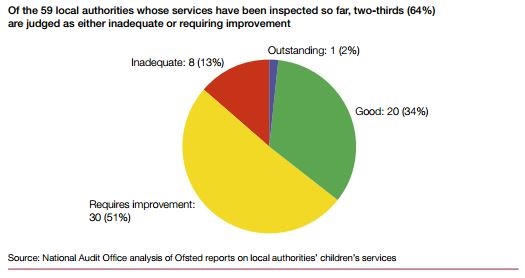20.07.15
NAO: Support systems for care leavers not working effectively
The system for supporting young people leaving foster or residential care in England is not “working effectively” and support varies widely between local authorities, the National Audit Office (NAO) has found.
In its ‘Care leavers’ transitions to adulthood’ report, the NAO stated that since November 2013 Ofsted inspections of care leaver services at 59 local authorities have found that two-thirds ‘require improvement’ or are ‘inadequate’.
By the end of June 2015, only 34% of local authority services were judged ‘good’, with just one – Trafford – judged to be ‘outstanding’.

This is despite the fact that local authorities must support care leavers until they are 21 years old – or 25 if they are in education or training. It is also estimated that every year around 10,000 16- to-18-year-olds leave foster or residential care in England.
In 2013 the government published the Care Leaver Strategy. This set out how it planned to improve support for care leavers, including in housing, health, employment and education, by co-ordinating the work of different departments.
However, the NAO stated that local authorities have no information on 17% of their 19-21 year-old care leavers even though they are often vulnerable.
On top of this, in 2013-14 local authorities spent on average £6,250 for each care leaver – this ranges from an estimated £300 to £20,000. But the NAO’s analysis shows there is minimal correlation between local authorities’ reported spending on care leavers and the quantity and quality of their services.
Commenting on the report’s findings, Meg Hillier MP, chair of the Public Accounts Committee, said: “It seems that some local authorities are turning their back on young people leaving their care, when two-thirds (64%) of local authority services for care leavers have been rated ‘inadequate’ or ‘requiring improvement’ since November 2013 and that only 8 out of 151 authorities know where all of their care leavers are living and whether they are participating in employment, education or training.
“It’s surprising that the Department for Education is unable to explain why the average amount local authorities said they spent on each care leaver varied so wildly from £300 to £20,000 in 2013-14. Even more concerning is that no relationship is found between how much local authorities report they spend and the quality of the support given to care leavers.”
In the defence of councils, a Local Government Association (LGA) spokesperson said: “Councils do what they can to support all care leavers. We desperately need to see the whole system properly funded and joined-up to ensure children and young people receive the support when they need it. It is vitally important that government departments work better together to continue the work to tackle our ineffective and fragmented mental health system.”
Amyas Morse, head of the NAO, stated that addressing the poor life outcomes of young people leaving care is a longstanding problem. The cost of their not moving into adulthood successfully is high.
“The government has made a commitment to improve the support for these young people but the outcomes for many have been deteriorating over the last seven years,” he said. “The government knows the scale of the challenge. Stronger central and local leadership is urgently required to get a grip on this problem.”
Tell us what you think – have your say below or email [email protected]